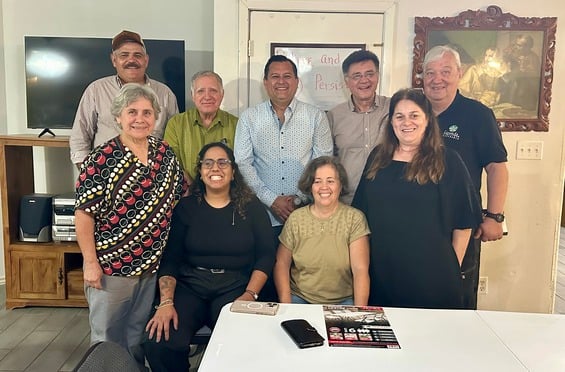Search
God’s grace in action
-
November 12, 2025It is a new moment for the Farm of Hope: one client has successfully completed the course, another continues his recovery in Brazil, and the Farm is expecting two missionaries awaiting visa approval. Now, the founders of the Farm of Hope have visited Corpus Christi, the first location in the U.S. “The initial phase is never that easy — the missionaries need to learn the language, understand the culture, and the U.S. has so many things to offer,” says Fr. Hans Stapel. “Once you have a bigger group, there are a lot more possibilities.” It was in his parish in Guaratingueta, near São Paulo, where everything began. Nelson Giovanelli, then 18, learned in the parish how to put the Gospel into practice, and it powerfully changed his life.
“I came back from a meeting at the parish, when I noticed some people my age who regularly met at a corner to do drugs. One day, I decided to stop and talk to them—if Jesus lives in every person, He also lives in them. Later that week, he asked one of them to teach him how to make bracelets. He was glad to do it and, afterward, told him he felt treated with dignity for the first time in a while. He then asked Nelson, “Can you help me get out of drugs? I don’t want my mother to cry for me anymore.”
Soon, they began living together again, seeking a new purpose in living the Gospel. It wasn’t a straight path; one of them relapsed, causing a domino effect. “One evening, I came home from work and found that all of them had left. I went to Mass, and Fr. Hans asked, ‘How is it going?’ I answered that everyone had left. Fr. Hans only asked, ‘Did God leave?’ I realized then – we are not seeking results or success, we are seeking Him.” Eventually, one by one, they all returned, beginning their road to recovery once more.
In 1983, the first Fazenda da Esperança, which means “Farm of Hope,” was established. Previously, they worked as gardeners or on farms, but now they could live together away from the city. Five years later, some girls asked Iraci Leite, who had joined Fr. Hans in various parish social activities, when the first rehab program for women would be set up. At that point, Nelson began opening a second farm in the northeastern state of Sergipe. His aunt, Luci Rosendo, was considering getting married but wanted to spend a few months volunteering and making sure that God was first in her heart. Could she help launch the project since they were searching for someone to assist Iraci?
“Soon, I was on my way to Guaratingueta, and one month later, we started the first female Farm of Hope. It was an incredible experience,” she shared. The months passed, and Luci never returned to her fiancé – she understood that God was calling her to consecrate herself to Him, serving in the “Family of Hope,” the community supporting the Farms worldwide.
There are now over 160 Farms across 28 countries, supported by dedicated lay members, priests, and both single and married volunteers. Leticia Castillo and her family volunteer at a Farm of Hope in Guadalajara. The work shows her daily how God’s grace, experienced through the community, can help people turn their lives around.
Sara Dias is one of the young people who found help. “I was raised by a single mom, and when I was 12, I lost my grandma.” Since her mother had to work double shifts, she found family on the streets, trying cocaine at the age of 13. “For two years, I consumed the drug every day. When someone I owed money to wanted to kill me, my mom called the cops and reported me.” The judge didn’t want to send her to prison but suggested the Farm of Hope. “When I arrived here, I expected a house with everyone being depressed, but the women there were happy; they immediately welcomed me.”
Sara found a way to fill the void inside her with something better than drugs - Staying connected with others who have experienced the same helps her handle the days when she feels down. Now, she works as an immigration lawyer in Boston and shares her story to inspire others who need help.
The Farm of Hope in Corpus Christi is the first, but plans are underway for a second in Biloxi, Mississippi, where the bishop supports this project that is not a quick fix but produces lasting results.

